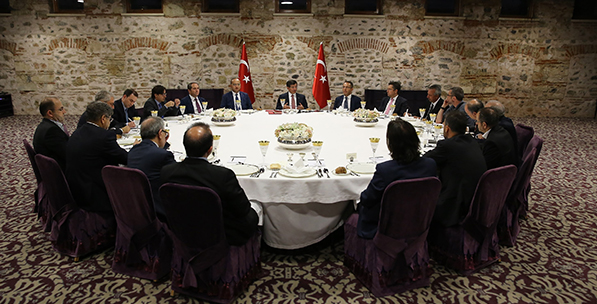A series of deeply concerning developments took place while the pain of the Suruç massacre was still fresh. PKK militants, acting in retaliation of the suicide bombing, killed two police officers and a civilian allegedly linked to the Islamic State of Iraq and al-Sham (ISIS). Almost overnight, the Turkish people, who should reasonably unite against terrorism, found themselves desperately looking for “the real perpetrators” of Monday’s attack. The go-to argument, obviously, was that the Justice and Development Party (AK Party) had facilitated the deaths of 32 civilians. “You supported them, you ignored them and you killed them,” radicals said.
In the face of Monday’s tragedy, the self-proclaimed experts did not care to remember that authorities had detained at least 600 terrorists since January 2015 as part of the fight against ISIS in the country. Hardly anyone cared about official statements from the United States, which leads a 60-nation coalition against ISIS, suggesting that Turkey was doing everything in its power to neutralize the threat. Why bother, pundits apparently thought, when you can stick to your guns. “The AK Party, an Islamist movement, is turning Turkey into an offshoot of ISIS,” a talking head remarked. There was, likewise, no point in looking into the situation in Syria when you could blame everything on the government’s allegedly neo-Ottoman foreign policy.
The opposition’s obsession with the AK Party and President Recep Tayyip Erdoğan currently serves as a veil that distorts their view and prevents them from accurately identifying the problems. The time has come for them to lift the veil and make a clean break from this intoxicating argument that the opposition uses to account for practically everything going on in the country. Erdoğan’s opponents might get rid of the AK Party one day, but they must keep in mind that the power vacuum will offer nothing more than a permanent inability to address the country’s pressing problems.
At this time it is necessary to develop a comprehensive understanding of the Suruç massacre and the PKK’s transgressions against the Kurdish reconciliation process. Since March 2013, Turkey has been dealing with several issues. On one hand, the international community’s failure to develop a comprehensive strategy to end the Syrian civil war has led to sectarian and ethnic clashes across the region. Unfortunately, the United States has been unwilling to heed the Turkish government’s warnings about the heavy costs of violent conflict. To be fair, it did not take a genius to understand that turning Syria into a playground of terrorist organizations and sub-state actors was a recipe for disaster. In the end, inaction created positive incentives for regional powers looking to expand their respective spheres of influence by fighting proxy wars. In recent years regional instability led to the emergence of groups like ISIS and the Democratic Union Party (PYD) as key actors in the Middle East.
Make no mistake, there is a clear tendency among the opposition ranks to blame the Syrian civil war on Turkey to impress the electorate. Recent developments, power struggles and local players all factors into the anti-Turkey campaign. Most importantly, experts like to pretend that Turkey has the resources to end the violent conflict in Syria alone.
When the Arab Spring revolutions began, the Turkish government had no choice but to side with pro-democracy activists against Syrian President Bashar Assad’s murderous regime. The country, likewise, admitted nearly 2 million refugees in accordance with its moral principles. In recent years, source nations, not Turkey, have been primarily responsible for thousands of Western fighters joining ISIS and other terrorist organizations.
Meanwhile, Turkey’s position toward the Syrian conflict is clearly not immune to changing circumstances. Factoring new players and challenges into its road map, the go









